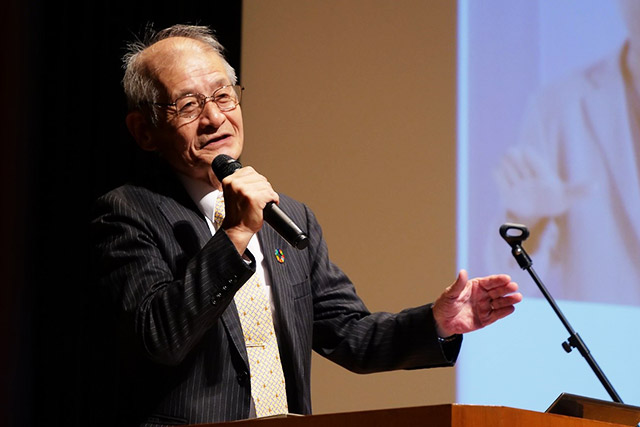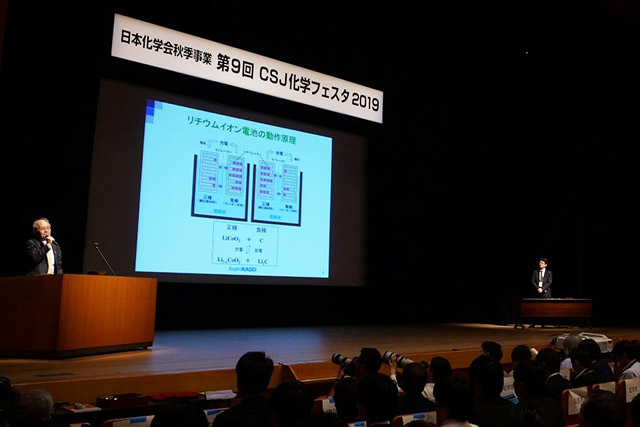News
Noble Prize Winner Dr. Yoshino Akira's Lecture in Tokyo: Research will Help Solve Environmental Problems Updated in December 2019
On October 15, Yoshino Akira, Honorary Fellow of Asahi Kasei, who is the recipient of the 2019 Nobel Prize in Chemistry, gave a lecture entitled “Development and Future of Lithium-ion Batteries” at a science event in Tokyo. It was his first lecture since he was selected as a recipient. He spoke in front of 700 visitors from industry, academia including students and the general public. Following in the footsteps of the late Japanese Nobel laureate Fukui Kenichi (1981 Nobel Prize in Chemistry), Dr. Yoshino said he would like to see future researchers solve environmental agendas.
This lecture was held as the opening of “9th CSJ Chemistry Festa 2019” hosted by the Chemical Society of Japan (Chair Dr. Kawai Maki). Each year, researchers in relevant fields had commented on the Nobel Prize of that year, but for this year, the lecturer was the delivered by the recipient himself.

Lithium-ion batteries are chargeable/dischargeable batteries widely used in notebook computers, smartphones, electric cars, etc. They formed the foundation of our present IT society, but are also expected to contribute to resolve future environmental problems. Dr. Yoshino contributed to the practical application of lithium-ion batteries, alongside two other Nobel Prize recipients: Dr. M. Stanley Whittingham who proposed the battery's mechanism allowing lithium ions to enter and exit; and Dr. John B. Goodenough who discovered the positive electrode material for lithium-ion batteries.
Dr. Yoshino talked about his relationship between two Japanese Nobel laureates while talking about the research and development of lithium-ion batteries. He introduced himself as the grandson of Dr. Fukui, who won the 1981 Nobel Prize in Chemistry. Dr. Yoshino said that Dr. Fukui's research had a major impact on both himself and Dr, Hideki Shirakawa, who also won the Nobel Prize in Chemistry in 2000.
Dr. Fukui won the Nobel Prize in Chemistry for his “Frontier Electronic Theory.” The theory of quantum chemistry for chemical reactions makes it possible to predict properties of new compounds theoretically by calculation, not by experiment. The conductive polymer “polyacetylene” discovered by Dr. Shirakawa, was backed up by Fukui's theory. Dr. Shirakawa later won the Nobel Prize in Chemistry for his accomplishments. Dr. Yoshino's battery development began with research on polyacetylene. The laureates are deeply interrelated.
“There is a history behind this research. First, Dr. Fukui made a very basic achievement, and based on that, Dr. Shirakawa discovered a very practical material. As a result, lithium-ion batteries were made and spread around the world," said Dr. Yoshino.
On the 19-year interval between each Nobel Prize in Chemistry (1981, 2000 and 2019), Dr. Yoshino humored himself by saying that “There must be a law. If I knew I was going to be a recipient, I didn't have to be worried over the last 10 years.” People in the audience responded with a warm laughter.

Dr. Yoshino also touched on expectations for the “ET revolution” that will follow the IT revolution. “E” refers to energy and environment, and “T” refers to technology. Dr. Yoshino stated that such technologies would bring about major changes to environmental problems, which are challenges for humans. “In the next 19 years, I hope other scientists will follow my path and receive the Nobel Prize for resolving environmental issues. It would be great if such a scientist would get awarded from Japan,” he alluded to our future and concluded his one-hour lecture.







